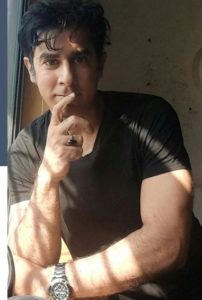Rajkumari Sharma Tankha

He takes pride in staying aloof from the petty rat race and enjoys walking along not trying to catch up with anyone. Who is this? You must be wondering. Well, he is Munawwar Sharifi, the same artist whose art installation you have seen at the Kala Ghoda Arts Festival 2018, It’s Ok! to Slow Down.
And as expected the installation drew a quite a number of eyeballs.
Why not? The installation It’s Ok! to Slow Down is expression of Sharifi’s thoughts; each element of this installation brings to the fore his innermost feelings. The large text in bold metal stresses that his voice should be heard while fine detailing speaks about the most of the small stories that play on in his mind. Are rukja re bande, are tham ja re bande the lyrics of this famous Bollywood song perfectly sum up his thoughts.
Seeing the world moving at a breakneck speed is not a very happy visual for him. With information overflowing 24 hours a day and social media platforms taking over everything in our life, our sole attention lies in the increasing momentum of our attempts to survival, but this will sooner or later end up in rapid erosion of health, productivity and quality of life.
The installation magnificently accentuates the very accustomed thought of abandoning the computer and giving time to reading a book or “actually” carrying out a conversation about anything, sometimes or even nothing!
The artist stays true to his expression explaining through his artwork the importance of sitting for a while and simply pondering instead of always trying to get things done.
“Those who don’t have a lot going on for them in life are considered boring by most others. And this might make them feel neglected. Through this installation, I wish to tell people that there’s nothing wrong with not being involved in a lot of things at the same time,” he says.
“The truest time to relax is when you don’t have time for it. This is something I have learnt through his own life experiences, both professional and personal,” he adds.
Sharifi prefers a slow-paced happier lifestyle. “People these days are giving a lot of importance to multitasking at work which hampers the quality of the work leading to immense work pressure and competition. Actually, this rat race begins right from childhood. A lot of kids these days are suffering from anxiety and depression,” he says.
He finds absolute beauty in stillness and justifies the significance of at times just standing still and staring, staring at everything possible and not doing anything about it.
Sharifi runs The Design Company in Mumbai. All his art installations are about his free-flowing ideas about life. The excellence in his works belies that fact that he has not learnt his craft from anyone, he is a self-taught artist.
It is the atmosphere at his home during his childhood days that influenced him deeply. “I saw my father working day in and day out, running a rat race, trying to earn finances to match my mother’s expectations,” he says.
“I had my own challenges to meet. My personal challenges coupled with what was happeneing at home made my life doubly difficult,” he remarks.
He grew up thinking that life was all about this rat race, the hectic pace to excel, make yourself better that the peers.
“It was only much later that I realised it is okay to be slow. I feel there is a great need to spread this word around. Believe me, there are a lot many like me who need to hear this,” he says.
“I wish someone had told me that it’s okay to be earning less; that it’s okay if my father is slow and does not make money that some others do so easily, be I would be contented in life,” he says.
“I want to stress on the old school of thought of mono-tasking as against the current cliched trend of multitasking and motivate people towards a slow-paced happier lifestyle. IT is much better than participating in the rat race of multitasking which leads to depression and anxiety among kids, college students and professionals,” he says.
As Eddie Cantor said, “Slow down and enjoy life. It’s not only the scenery you miss by going too fast – you also miss the sense of where you are going and why.”
“There is no rush. There shouldn’t be,” he says.